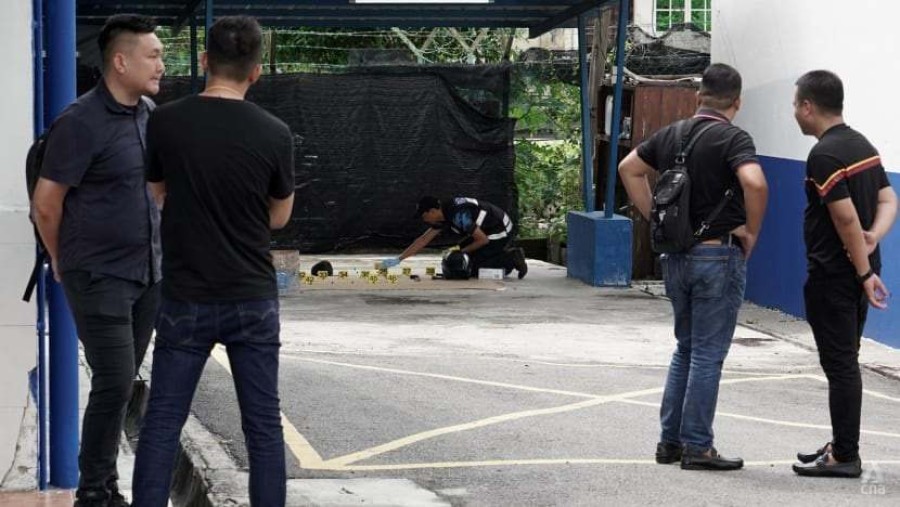Suspect in Johor police station attack was ‘lone wolf’, says Malaysia's home minister
18 May, 2024

The suspect who attacked a Johor police station on Friday morning was believed to have acted alone and did not have plans to threaten the wider public, Malaysia's Home Minister Saifuddin Nasution Ismail said on Saturday (May 18).
Malaysia's Home Minister Saifuddin Nasution Ismail stated that the suspect who attacked a Johor police station acted alone without plans to threaten the public. Early investigations revealed no links to terrorist groups, despite the suspect's association with Jemaah Islamiyah. The motive remains under investigation.
“We have found that based on early investigations, the attacker acted on his own, he was a lone wolf. He was driven by certain motivations based on his own understanding because he rarely mixed with others,” Mr Saifuddin said at a news conference.
“Because of this, we can establish that based on our questioning of certain individuals, he acted individually and is separated from some big overall mission or a dangerous group. There is no such thing.” Mr Saifuddin added that the attack was not linked to any group, although the minister did not disclose a motive for the attack pending investigations. The police said on Friday that there was evidence the 21-year-old suspect was a member of the terrorist group Jemaah Islamiyah (JI).
But authorities have concluded that the suspect acted on his own, after interviewing 46 people who were flagged in their database as persons of interest.
The attack at Ulu Tiram police station on the outskirts of Johor Bahru left two police officers dead and one other wounded. The suspect was also shot dead during a firefight with police.
Five of the suspect's family members were arrested, including his father.
Two others who were making a police report at the time have also been nabbed. Police deemed it was “not logical” for them to be reporting an incident which allegedly took place two years ago, implying that they might be involved in the attack as a distraction for police.
Mr Saifuddin told reporters that the 46 people who were questioned immediately after the incident were assisting with investigations and were not arrested.
“These individuals were called up for purposes for police to interview them to establish motives (of the suspect),” he said.
The minister also stressed that the police were still investigating the motive of the suspect and urged the public to stop speculating.
“We want to reassure everyone that public safety is of utmost importance, and that the police will do its best to resolve this incident,” he added.
Residents in a village where the suspect lived told CNA that the family was reserved and kept to themselves. There were no signs they were extremists or terrorists.
The suspect's father, 62, is a known member of JI, according to the police.
They earlier said they were tracking down more than 20 known JI members in Johor.
JI is linked to Al Qaeda, the terror group that carried out the 9/11 attacks in the US in 2001. It is responsible for some of Indonesia’s deadliest terror attacks, including the 2002 Bali bombings which killed more than 200 people.
JI's spiritual leader Abu Bakar Bashir set up a religious school or madrasah in Ulu Tiram called Luqmanul Hakiem in the early 1990s, which is within 100 metres of the suspect’s home in Kampung Ulu Tiram.
The school was attended by Noordin Muhammad Top, the suspected mastermind of the Jakarta hotel bombings in 2009, as well as another JI militant Mukhlas who was part of the 2002 Bali bombings.
While the attack has raised security fears in Malaysia and even the region, security experts earlier told CNA that it is too early to tell if the incident points to a resurgence of a terrorist cell in Johor.
Extremism expert Munira Mustaffa, founder of security consultancy Chasseur Group, told CNA that the information given by the home minister on Saturday showed that the public should be cautious against labelling the incident as a terrorist attack and wait for police investigations before jumping to conclusions.
"This not something to worry about. It's an isolated incident," said Ms Munira.
"We can't call this a terror attack until we know what is the message."
Ms Munira said that further police investigations will likely reveal more about the suspect's motives.
"So Saifuddin said he was a loner and not very social. That's already a good clue," she added.
Source: www.channelnewsasia.com
